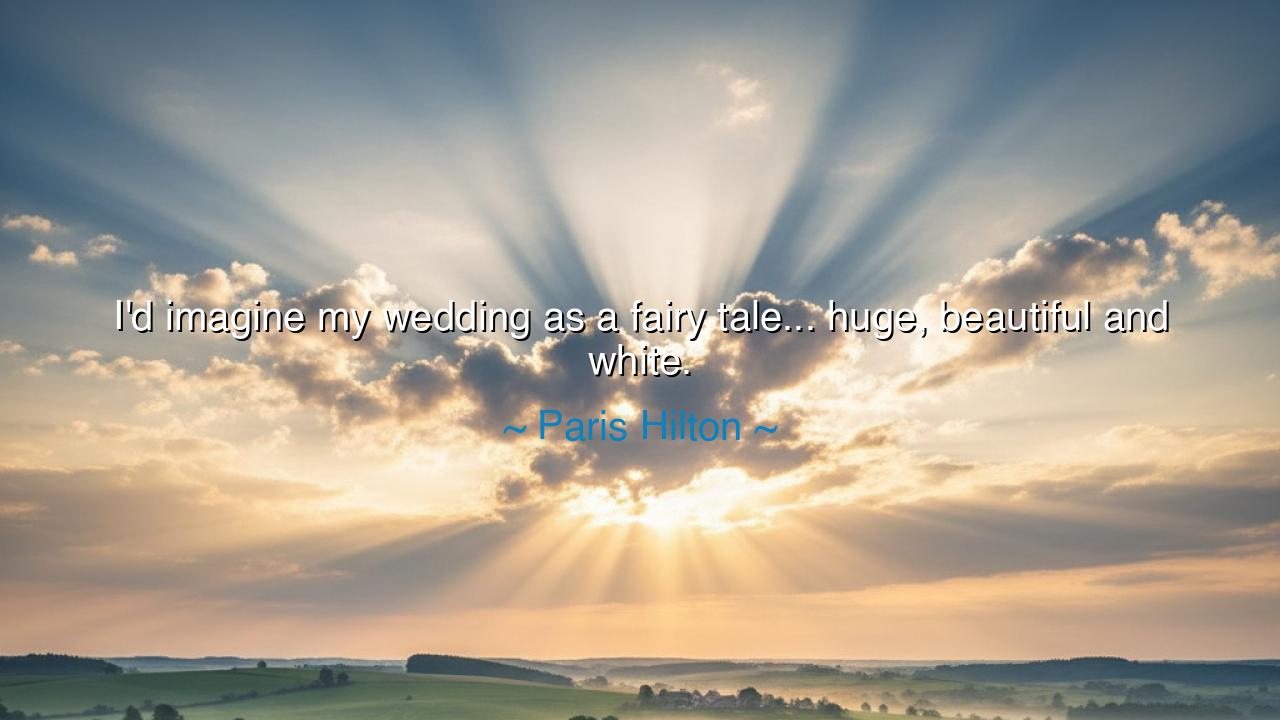
I'd imagine my wedding as a fairy tale... huge, beautiful and






Hearken, children of generations yet unborn, to the words of Paris Hilton, who dreamed aloud: “I’d imagine my wedding as a fairy tale… huge, beautiful and white.” In these utterances rests the eternal human longing for splendor, purity, and storybook perfection. The heart yearns to transform a singular day into a canvas of dreams, where love is not merely felt but manifested in grandeur, adorned with light, and imbued with the radiance of hope. The wedding becomes a stage upon which the soul enacts its deepest aspirations for beauty and transcendence.
Hilton’s vision speaks to the fantasy of the human spirit, the desire to see our lives mirror the stories whispered to us in youth, where heroes triumph, and unions are marked by majesty and joy. In her words, the color white signifies purity, renewal, and the sacred promise of shared life. It is a symbol carried through centuries, from the royal halls of Europe to the simplest village chapels, a testament to the enduring human impulse to ritualize love in forms that elevate the ordinary to the extraordinary.
Consider the tale of Queen Victoria, whose wedding in 1840 to Prince Albert captivated the world. Her gown, resplendent in white, and the pageantry surrounding the ceremony, set a precedent for generations, demonstrating how a wedding might become both a personal declaration of love and a public spectacle of beauty. The enormity of the celebration did not diminish the intimacy of the vow; rather, it amplified the significance of the union, marrying the heart’s private longing with the world’s admiration.
Yet beneath the glitter and grandeur lies the subtle teaching: the desire for a fairy tale reflects a deeper human yearning for harmony, for life to mirror the ideal forms imagined in dreams. Hilton’s words remind us that even as we strive for magnificence, the essence of the celebration is the bond it honors. Without love, beauty alone is but decoration; with love, it becomes a testament to human aspiration, a bridge between imagination and reality.
Thus, let the ancients whisper their counsel: to imagine a day as huge, beautiful and white is to honor the capacity of the human spirit to dream boldly, to seek joy without restraint, and to celebrate love in forms that resonate through memory and story. Let this vision guide those who prepare their own rites, blending fantasy and fidelity, spectacle and sincerity, in the sacred act of union.
Carry this wisdom, children of ages yet to dawn: the grandeur of a wedding, like the light of the stars, illuminates not only the eyes but the soul. Dream boldly, adorn life with beauty, and let the purity of intention shine, for in these moments, the human spirit steps into its own fairy tale, eternal and luminous.






RRnch
There’s something very revealing about this vision of a wedding — it’s less about love and more about presentation, almost like a performance. It makes me think about how much of our modern idea of romance is rooted in spectacle and image. Do you think this mindset reflects genuine desire or media conditioning? Maybe fairy-tale weddings say more about how we want to be seen than how we actually feel.
PTphuong thao
This idea of a fairy-tale wedding feels both aspirational and nostalgic. It’s easy to see why someone like Paris Hilton, who grew up in the public eye, would dream of something grand and beautiful. Still, I wonder if the ‘huge and white’ imagery represents more than style — maybe it’s about control and the desire for a flawless moment in a chaotic life. Can such perfection ever truly feel real?
VTThi Thu Vy Tran
Hilton’s quote captures a very traditional and glamorous view of love. It makes me curious whether she sees that fantasy as symbolic or literal. Many people equate a grand wedding with happiness, but do you think such extravagance reflects confidence in the relationship or insecurity about how it’s perceived? It’s fascinating how the concept of the ‘perfect wedding’ still carries so much cultural power.
NANgoc Anh
There’s something sweet but also telling about this statement. It reflects how deeply the fairy-tale narrative shapes our idea of romance. I can’t help but wonder whether that ideal sets people up for disappointment once real married life begins. Should weddings be about visual perfection or emotional authenticity? Maybe the dream itself isn’t the problem — it’s the expectation that real life should always feel like the fantasy.
KHDang Khanh Hoa
I get the appeal of a grand, fairytale wedding — it’s something many people grow up envisioning. But I also wonder if the focus on glamour takes away from the emotional intimacy of the day. Maybe Hilton is expressing a dream built from pop culture imagery more than personal connection. Do you think the fantasy of a ‘perfect’ wedding helps people believe in love, or does it just commercialize it further?